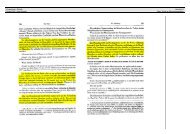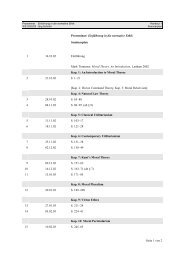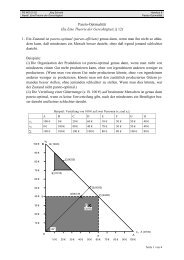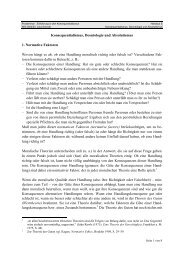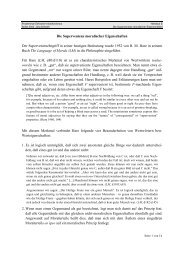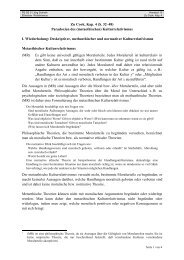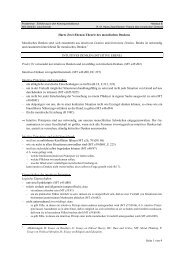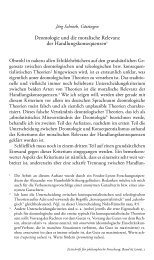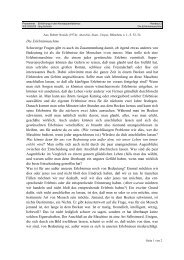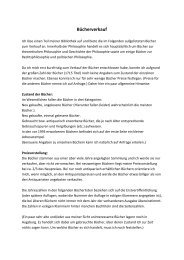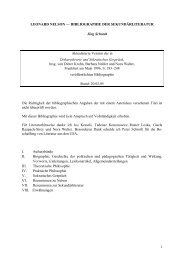Adäquatheitskriterien für moralische Theorien - Jörg Schroth
Adäquatheitskriterien für moralische Theorien - Jörg Schroth
Adäquatheitskriterien für moralische Theorien - Jörg Schroth
You also want an ePaper? Increase the reach of your titles
YUMPU automatically turns print PDFs into web optimized ePapers that Google loves.
Proseminar Einführung in die normative Ethik Handout 3<br />
WS 2002/03 <strong>Jörg</strong> <strong>Schroth</strong> <strong>Adäquatheitskriterien</strong> <strong>moralische</strong>r <strong>Theorien</strong><br />
(4) Moral theories should identify afundamental principle that both (a) explains<br />
why our more specific considered moral convictions are correct and (b)<br />
justifies them from an impartial point of view.<br />
(5) Moral theories should help us deal with moral questions about which we are<br />
not confident, or do not agree. (Brad Hooker, Ideal Code, Real World, Oxford<br />
2001, S. 4)<br />
Tom L. Beauchamp/James F. Childress (1994)<br />
Awell-developed ethical theory provides aframework within which agents can reflect<br />
on the acceptability of actions and can evaluate moral judgments and moral character.<br />
[...]<br />
Criteria for Theory Construction<br />
We begin with eight conditions of adequacy for an ethical theory. These proposals for<br />
theory construction set forth exemplary conditions for theories, but not so exemplary<br />
that atheory could not satisfy them. That all available theories only partially satisfy the<br />
demands in these conditions is not of concern here. The objective is to provide abasis<br />
from which to assess the defects and the strengths of theories. Satisfaction of these<br />
conditions protects a theory from criticism as a mere list of disconnected norms<br />
generated from our pretheoretic beliefs. The same general criteria of success in amoral<br />
theory can be used for any type of theory (for example, ascientific theory or apolitical<br />
theory). The eight conditions that follow express these criteria.<br />
1. Clarity. First, atheory should be as clear as possible, as awhole and in its parts.<br />
Although we can expect only as much precision of language as is appropriate, more<br />
obscurity and vagueness exists in the literature of ethical theory and biomedical ethics<br />
than is necessary or justified by the subject matter.<br />
2. Coherence. Second, an ethical theory should be internally coherent. There should be<br />
neither conceptual inconsistencies (for example, “strong medical paternalism is justified<br />
only by consent of the patient”) nor contradictory statements (for example, “to be<br />
virtuous is amoral obligation, but virtuous conduct is not obligatory”). [...] However,<br />
consistency is not asufficient condition of agood theory, only anecessary condition. If<br />
an account has implications that are incoherent with other established parts of the<br />
account, some aspect of the theory needs to be changed in away that does not produce<br />
further incoherence. [...]<br />
3. Completeness and Comprehensiveness. A theory should be as complete and<br />
comprehensive as possible. Atheory would be entirely comprehensive if it included all<br />
moral values. Any theory that includes fewer moral values will be somewhere on a<br />
continuum from partially complete to void of important values. [...]<br />
Seite 2 von 4



